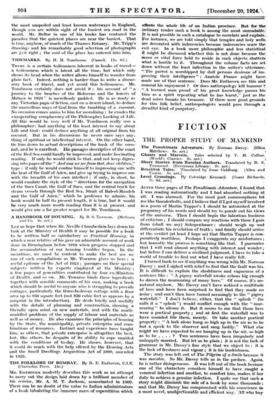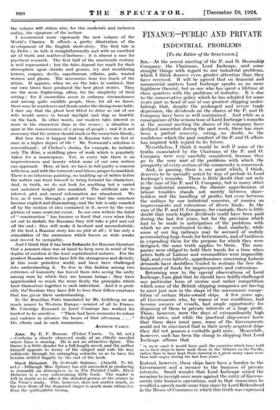FICTION
THE PROPER STUDY OF MANKIND
The Penultimate Adventure, By Norman Davey. (Elkin Matthews. 6s. net.) Ghosts and Marvels. Tales selected by V. H. Collins.
Brazilian Tales. Translated by Isaac Goldberg. (Allen and - Unwin. 5s. net.) AFTER three pages of The Penultimate Adventure, I found that I was reading automatically and I had absorbed nothing at all. I was alarmed. For the most part commonplaces hit me like thunderbolts, and I believe that if I got myself involved' in a poem of Martin Tupper's I should be astonished at the pregnancy of his words and should try to puzzle out his views of the universe. Then I should begin the laborious business of criticism ; I should compare my reactions with those I gain from (shall we say) Schopenhauer : should weigh up and differentiate his revelation of truth ; and finally should arrive at the verdict (at least I hope so) that Martin Tupper is com- paratively worthless. Perhaps I exaggerate my misfortunes ; but honestly the process is something like that. I guarantee that I will read almost anything with interest and wonder ; but before I can deliver a civilized judgment, I have to take a world of trouble to find out what I have really felt.
I turned back to see if anything was wrong With Mr. Norman Davey ; and I sighed with relief to find that the fault was his., It is difficult. to explain the shoddiness and vagueness of a sentence like : "A pigmy waterfall awoke echoes big enough to drown the murmuring of many bees." Of course, it's- un- natural anyhow. Mr. Davey can't have noticed a multitude of bees and have been surprised to find that they made no noise ; and can't then have turned accusingly to the" pigmy waterfall." I don't believe,' either, that the " splash " (he calls it a "splash ") would conflict enough with the " mur- muring " to silence it. But it seems to me that those bees were a poetical property ; and at first the waterfall was to have sounded like them, merely. Or take another poetical property : A lark alone hung so high up in the air as to be but a speck to the observer and sang lustily." What else might we have expected to see hanging up in the air, so high as to be. . . . ? Two sentences have been irregularly and unhappily married. But let us be plain ; it is not the lack of grammar in Mr. Davey's fine style that we object to : it is the lack of freshness and vigour; it is his bookishness.
The story was left out of The Pilgrim of a Smile because it was 'macabre. So Mr. Davey tells us in the preface. Again. he is rather disingenuous. It was left out of the book because one of the characters considers himself to have caught a venereal infection and another, to comfort him, makes it her duty to achieve a genuine infection. I quite see that such a story might diminish the sale of a book by some thousands ; and that Mr. Davey has compromised with his conscience in a most novel, unobjectionable and efficient way. All who buy
the volume will obtain also, for this moderate and inclusive outlay, the signature of the 'author.
I recommend more vigorously the new volume of the World's Classics. It affords a pretty illustration of the development of the English short-story. The first tale is by Defoe ; he tells it straightforwardly and with an excellent air, of truth and matter-of-factness : it is almost a case for psychical research. The first half of the nineteenth century is well represented ; but the tales depend too much for their atmosphere upon shrieks and groans, ivy and mouldering towers, corpses, devils, superhuman villains, pale, wasted women and gloom. The accessories bear too. much of the strain. It appears, when we see the tales in contrast, that our own times have produced the best exist stories. They are the more frightening, often, for the simplicity of their setting ; for if enormities occur in ordinary circumstances and among quite credible people, then, for all- we know, there may be murderers and fiends under the dining-room table. I dare say that the ghost best fitted to drive us out of our wits would arrive in broad daylight and Slap us heartily on the back. In other words, our modern tales interest us more in the characters than in the scenes ; a situation is spun in the consciousness of a group of people ; and it is not necessary that the mirror should crack or the moon turn bloody.
But how does it happen that in Russian tales we feel at once in a higher degree of life ? Mr. Townsend's selection is conventional ; of Chehov's stories, for example, he includes only The Kiss, a middling piece of work which is popularly taken for a masterpiece. Yet, in every tale there is an impressiveness and beauty which none of our own writers can approach. Here, at last, we have in full purity a concern with men, and with the torments and Misses proper to mankind. There is no laborious painting, no building up of milieu before the author can trust himself to bring forward his characters. And, in truth, we do not look for anything but a varied and sustained insight into mankind. The artificial aids to interest, plot and casual- information are abandoned. We live, as it were, through a patch of time that has somehow become explicit and illuminating ; and the tale is only rounded off by the motion of idea contained in it, never by the Com- pletion of some material event. In our own writers the habit of " construction" has become so fixed that even when they set out to imitate the Russians they will take a plot and cut off the end ; they will make it hesitant and uncomfortable. At the best a Russian story-has no plot at all ; it has only a stimulation of the awareness which leaves us wide awake and moved to sympathy.
And I think that it has been fortunate for Russian literature that a peasant class was at hand to keep men in mind of the depths of emotion in the least sophisticated natures. For the greatest Russian writers have felt the strangeness and divinity of this more primitive world, and have been challenged into understanding it. To live in this fashion among two extremes of humanity has forced them into seeing the unity among men by which they are human beings ; they have apprehended so much the more fierily the principles which knot themselves together in each individual. And it is prob- ably the freedom they have felt to love their fellow-creatures that has given them understanding.
In the' Brazilian Tales translated by Mr. Goldberg we are much nearer to Western Europe—nearest of all to France. Mr. Coleridge Kennard in Level. Crossings has worked his hardest to-be sensitive. "There had been memories to colour and cadehee in advance the hours of that afternoon . . " His efforts end in such mannerism.
ANDREW CAREY.











































 Previous page
Previous page